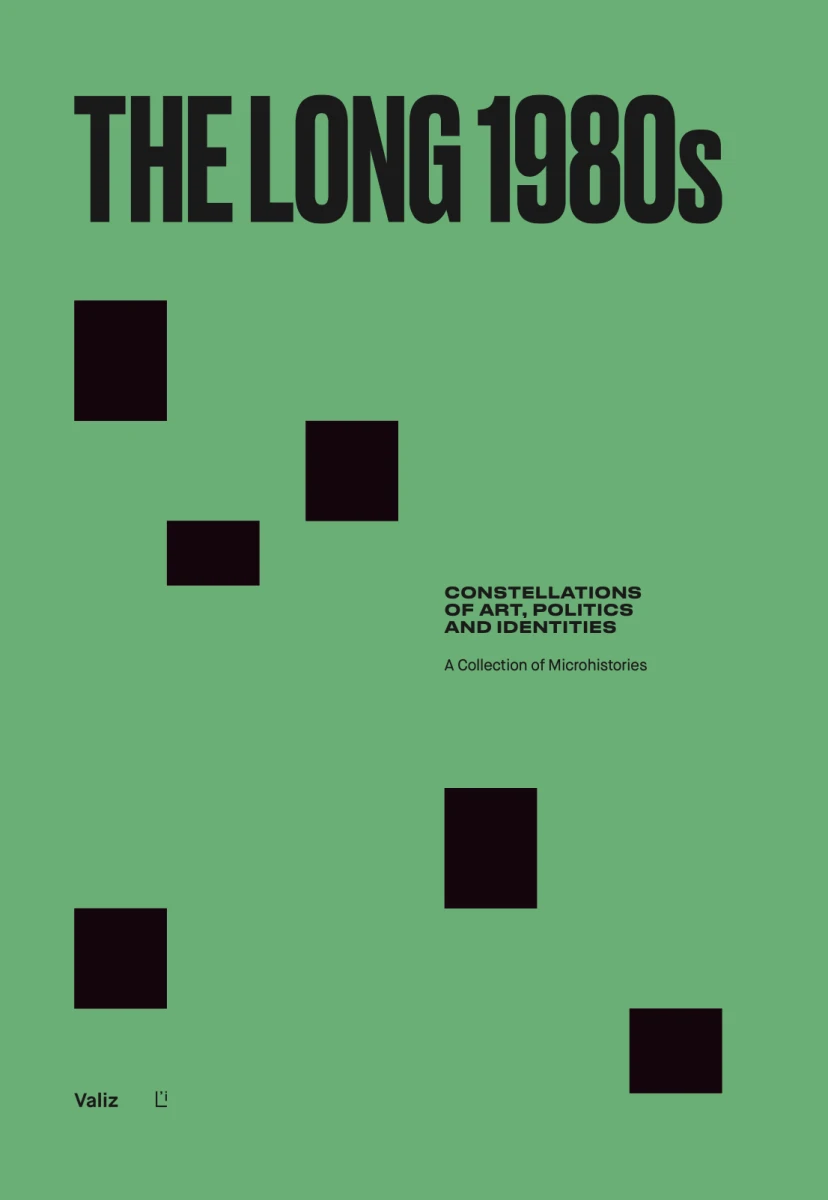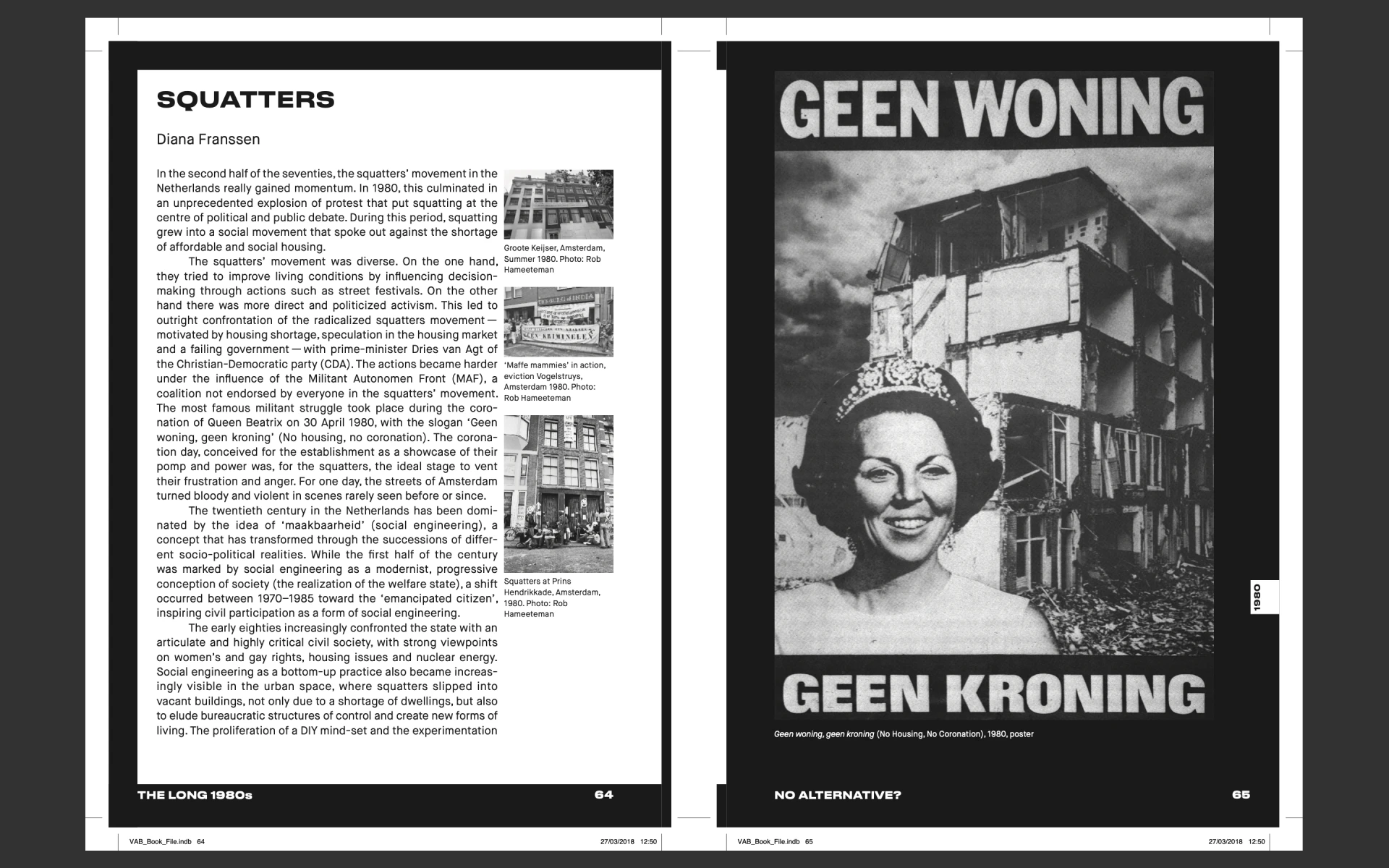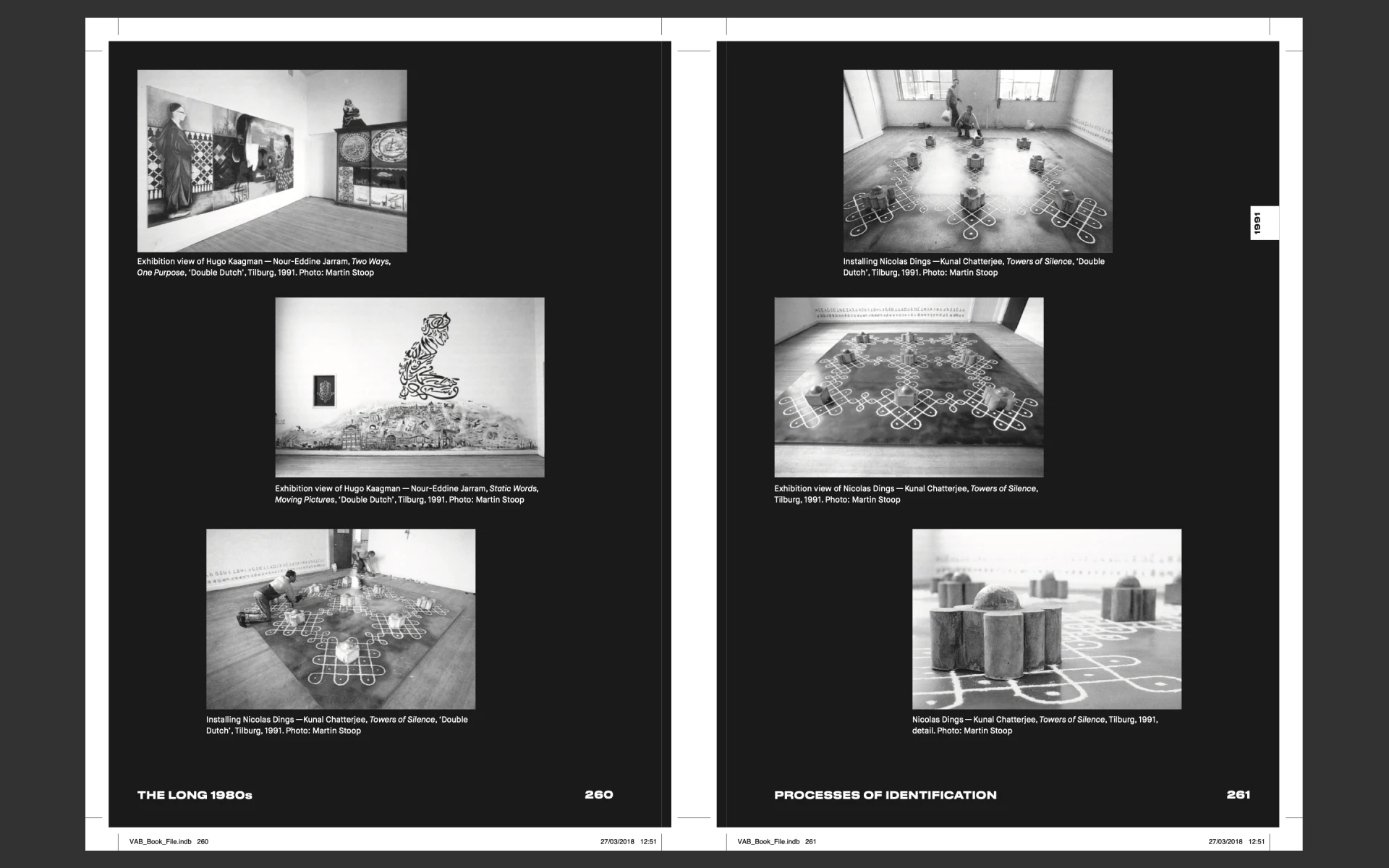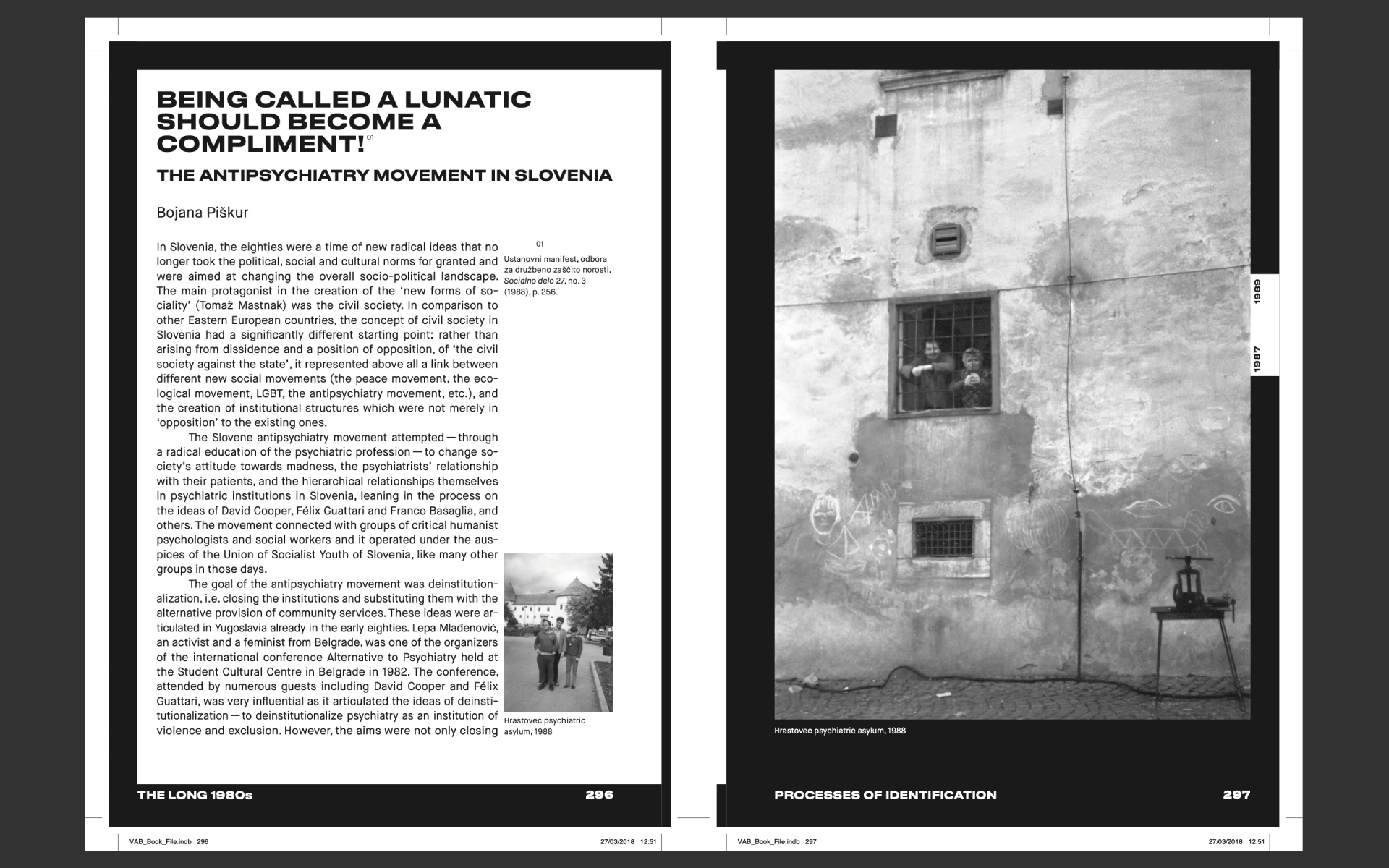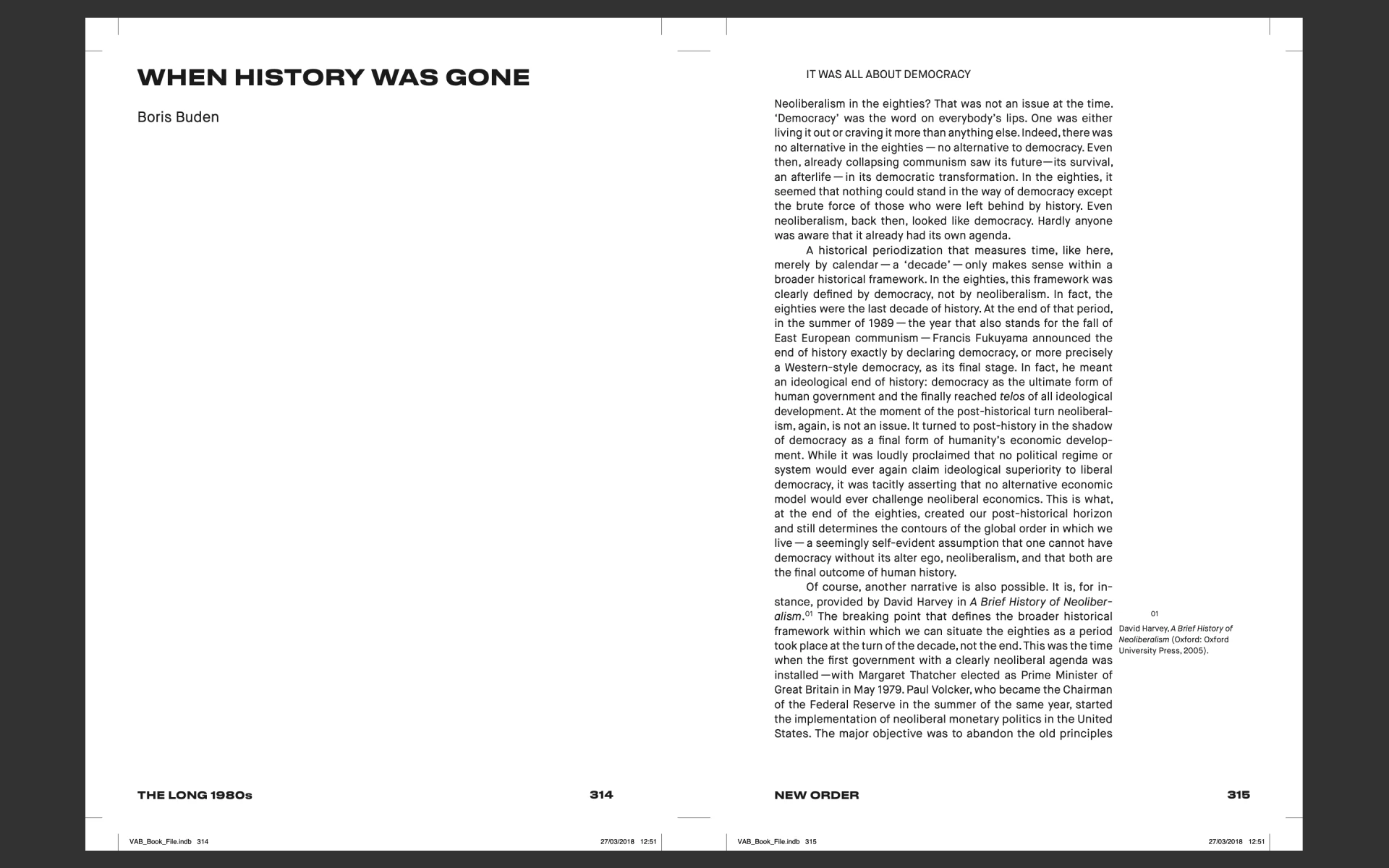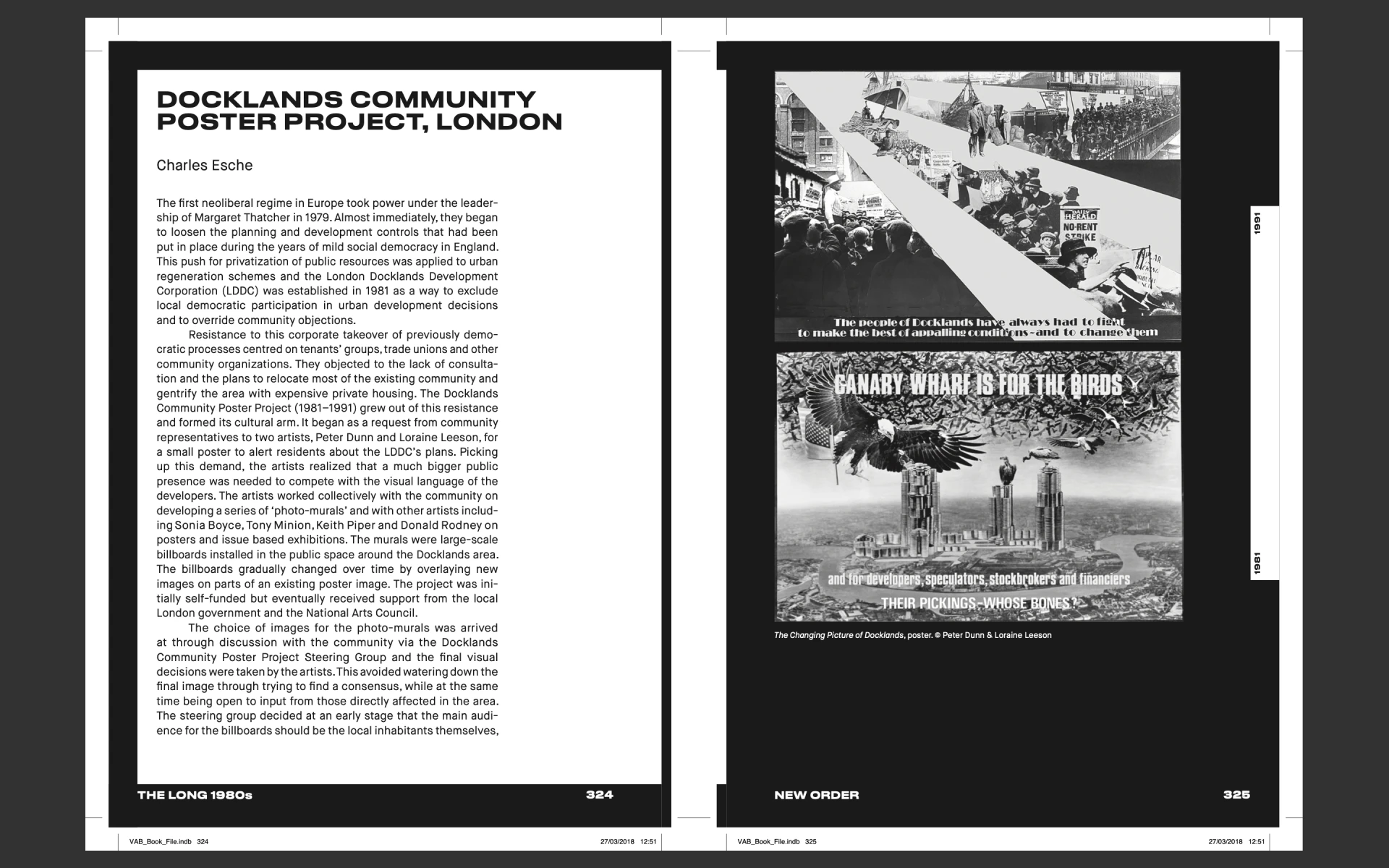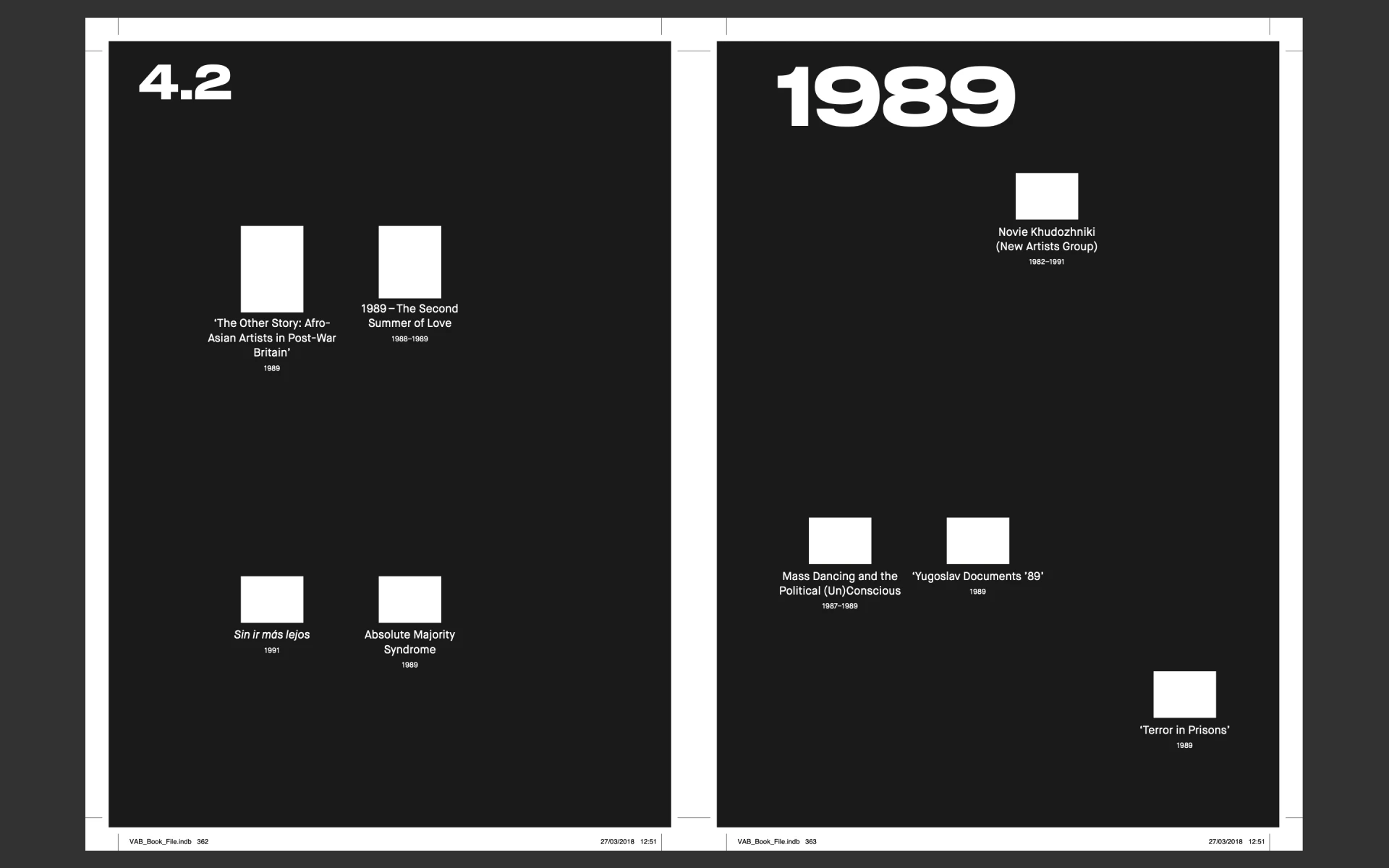The Long 1980s. Constellations of Art, Politics and Identities
Edited by Nick Aikens, Teresa Grandas, Nav Haq, Beatriz Herráez, and Nataša Petrešin-Bachelez
Graphic Design: George & Harrison
Published by L'Internationale and Valiz
Contents
-
1.The Long 1980s. Constellations of Art, Politics and Identities – An Introduction
-
2.‘It will have been the best of times: thinking back to the 1980s’
-
3.From Anti-Social-Liberal Punk to Intersectional Aids Activism (Sub-)Culture and Politics in Eighties Europe
-
4.PART 1: NO ALTERNATIVE? – Introduction
-
5.Dissent and the Neoliberal Condition
-
6.The Temporary Autonomous Zone, Ontological Anarchy, Poetic Terrorism
-
7.Squatters
-
8.Premature Architecture Isidoro Valcárcel Medina
-
9.Rave
-
10.Montevideo
-
11.Neue Slowenische Kunst
-
12.The Phlegm of Taller Llunàtic
-
13.BİLAR Corporation
-
14.Autonomy, Revolt and the Imagination to Leave the Stage Reading Bluf! (Amsterdam) and Radikal (Berlin)
-
15.Sokak
-
16.‘A political poster must be like a blow into an open wound’
-
17.Club Moral Moral and Mental in Antwerp
-
18.1984: The Adventures of the Alternative
-
19.Black Film Workshops
-
20.‘Talking Back to the Media’
-
21.‘La imagen sublime’ Video Art Practices in Spain
-
22.Jef Cornelis' The Longest Day
-
23.PART 2: KNOW YOUR RIGHTS – Introduction
-
24.Environmental Protest in Europe in the Eighties
-
25.Orbanist Manifesto
-
26.Greenham Common
-
27.Radical Democrats in Turkey Political Icebreakers in the Mid-Eighties
-
28.Razmerja and Ecology
-
29.El Viejo Topo
-
30.Insubordination in Spain Authoritarian Socialist Modernity and Widespread Antagonistic Disobedience
-
31.‘No to Compulsory Military Service’
-
32.‘Know Your Rights’
-
33.Contradictions of the Socialist Civil Society in Nineteen-Eighties Yugoslavia
-
34.Verbal Delict
-
35.‘Petition of Intellectuals’
-
36.Rocío, 88 minutes, Tangana Films A Film by Fernando Ruiz and Ana Vila
-
37.Policing the Crisis, The People’s Account and Handsworth Songs
-
38.The Feminist Movement in Nineteen-Eighties Spain Emergence and Fragmentation
-
39.The Danger to Society and Social Rehabilitation Law
-
40.AIDS, Sexual Dissidence and Biopolitical Activism
-
41.The Birth of the Gay Scene in Slovenia
-
42.‘Pretended’ Family Relationships, Sunil Gupta
-
43.‘100%’
-
44.PART 3: PROCESSES OF IDENTIFICATION – Introduction
-
45.Unity in Difference Artistic Practices Across Class, Sex and Race in Black British Art
-
46.Black Phoenix
-
47.‘5 Black Women’, ‘Black Woman Time Now’ and ‘The Thin Black Line’
-
48.Black Women’s Movement (ZMV)
-
49.‘Double Dutch’
-
50.J. Lambrecht & The Belgian Institute for World Affairs in the Eighties
-
51.Nation, Democracy and Gender
-
52.From ‘Personal is Political’ to ‘Women in Black’
-
53.Istanbul Kurdish. To Be a Kurd and a Woman in the City
-
54.‘Irritating’ New Feminism of the NineteenEighties in Ljubljana
-
55.Being There A Very Partial Traverse of European Exhibitions and AIDS Activism at the end of the Twentieth Century
-
56.Pepe Espaliú, Carrying, 1992, Performance
-
57.Being Called a Lunatic Should Become a Compliment! The Antipsychiatry Movement in Slovenia
-
58.Hugo Roelandt
-
59.143.353 (the eyes do not want to be always shut)
-
60.PART 4: NEW ORDER – Introduction
-
61.When History Was Gone
-
62.Numax presenta
-
63.Docklands Community Poster Project, London
-
64.Genuine ‘KOT’ or ‘Muhteşem’ Copies
-
65.Hüseyin Bahri Alptekin
-
66.Freedom for What? The Uses of Freedom, between Dictatorship and Democracy in Portugal
-
67.The Formation of the Slovenian Lacanian School
-
68.Declension
-
69.Artists’ Initiatives in the Netherlands
-
70.Culture, That Government Invention
-
71.‘Terror in Prisons We Won’t Let You Kill Them’
-
72.Mass Dancing and the Political (Un)Conscious
-
73.‘Yugoslav Documents ’89’
-
74.Novie Khudozhniki (New Artists Group) St. Petersburg in the Eighties
-
75.Absolute Majority Syndrome
-
76.Sin ir más lejos
-
77.‘The Other Story: Afro-Asian Artists in Post-War Britain’
-
78.1989—The Second Summer of Love
-
79.Contributors
-
80.Index of Names
-
81.Index of Works, Exhibitions, Projects, Events, Organizations
-
82.Acknowledgements
-
83.Colophon
The Long 1980s considers the significance of the 1980s for culture and society today. It revisits this pivotal decade via a collection of microhistories from across Europe that span the fields of art, culture, and politics. Central to the stories in this book is the changing relationship between ideologies, governments, and their publics, the effects of which have come to shape the contemporary condition of Europe and beyond. Artists, writers, and activists were responding to and articulating these changes in myriad ways: in the streets, through words, images, objects, and actions. At the same time, new subjectivities were emerging at the intersection of race, class, gender, and sexuality, all voices that were demanding to be heard.
The publication is divided into four thematic chapters: 1. No Alternative? (on counter cultures, alternative forms of self-organization and art as activism); 2. Know Your Rights (on civil liberties, the rising planetary consciousness and new ecologies); 3. Processes of Identification (on anti-colonial positions and the drive for sexual and gender equality through culture); 4. New Order (on the far-reaching effects of the neoliberal regime and, finally, the significance of the year 1989). Comprising newly commissioned essays by leading thinkers alongside seventy case studies, including images and archival material published for the first time, this reader offers an invaluable and alternative reading of the recent past. A constellation of over seventy micro-histories, ranging from significant exhibitions or events to publications or key essays are presented across the four sections, spanning the different contexts out of which the research developed: Belgium, Catalonia, the Netherlands, Slovenia, Spain, Turkey and the UK. These case studies are presented through a rich combination of archival material, reproductions or reprinted texts with introductions by curators, historians, and theorists.
Editors: Nick Aikens (Van Abbemuseum, Eindhoven), Teresa Grandas (MACBA, Barcelona), Nav Haq (M HKA, Antwerp), Beatriz Herráez (independent curator, San Sebastián), and Nataša Petrešin-Bachelez (L'Internationale Online).
Contributors: Nick Aikens, Henry Andersen, Zdenka Badovinac, Barış Gençer Baykan, Cristina Cámara Bello, Hakim Bey, Manuel Borja-Villel, Rosi Braidotti, Boris Buden, Jesús Carrillo, Bojana Cvejić, Luc Deleu, Ayşe Düzkan, Diedrich Diederichsen, Nazım Hikmet Richard Dikbaş, Corinne Diserens, Merve Elveren, Charles Esche, Marcelo Expósito, Božidar Flajšman, Annie Fletcher, Diana Franssen, June Givanni, Lisa Godson, Teresa Grandas, Nav Haq, Beatriz Herráez, Lubaina Himid, Lola Hinojosa, Antony Hudek, Tea Hvala, Gal Kirn, Neža Kogovšek Šalamon, Anders Kreuger, Elisabeth Lebovici, Rogelio López Cuenca, Geert Lovink, Amna Malik, Pablo Martínez, Lourdes Méndez, Aleš Mendiževec, Ana Mizerit, Alexei Monroe, Meriç Öner, Nataša Petrešin-Bachelez, Bojana Piškur, Marta Popivoda, Carlos Prieto del Campo, Pedro G. Romero, Rafael Sánchez Ferlosio, Igor Španjol, Chris Straetling, Luis Trindade, Erman Ata Uncu, Jelena Vesić, Mar Villaespesa, Vladimir Jerić Vlidi, and Ana Vujanović.
2018, Valiz with L'internationale | supported by the Culture Programme of the European Union | partner: KASK School of Arts, University College Ghent | paperback | 416 pp. | English | ISBN 978-94-92095-49-7 | Design by George & Harrison. To purchase the book, please follow this link to the website of our publisher, Valiz.
